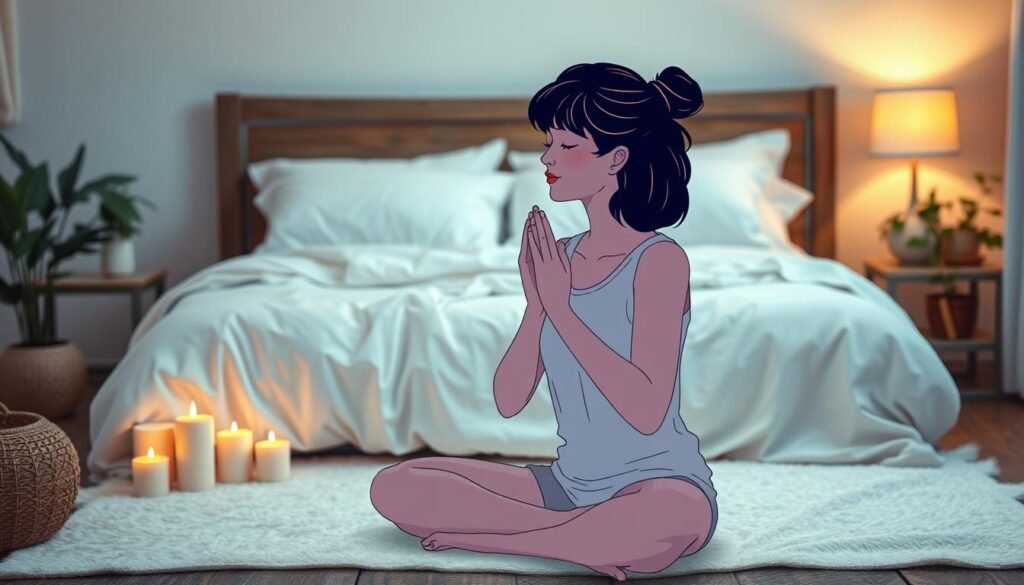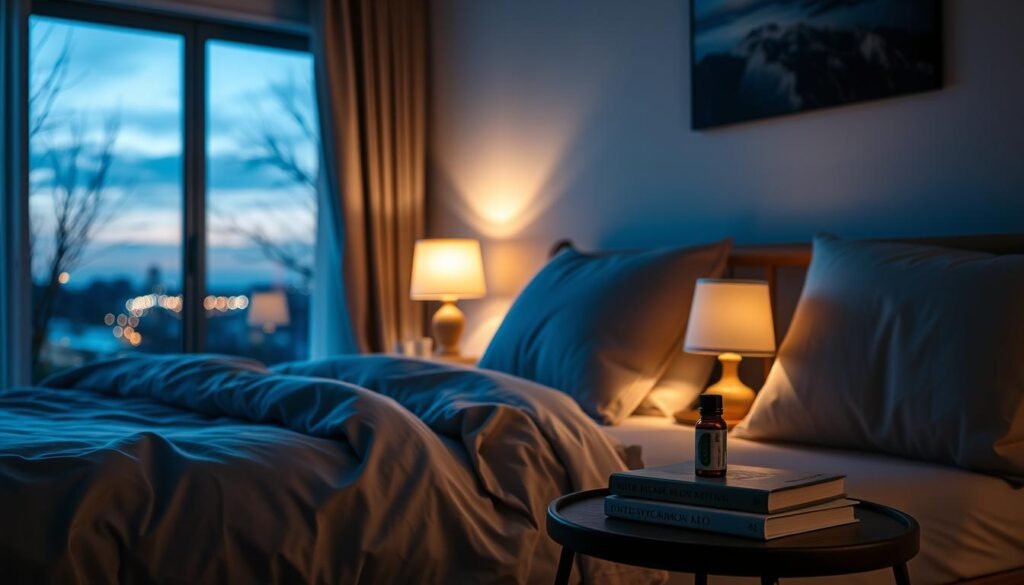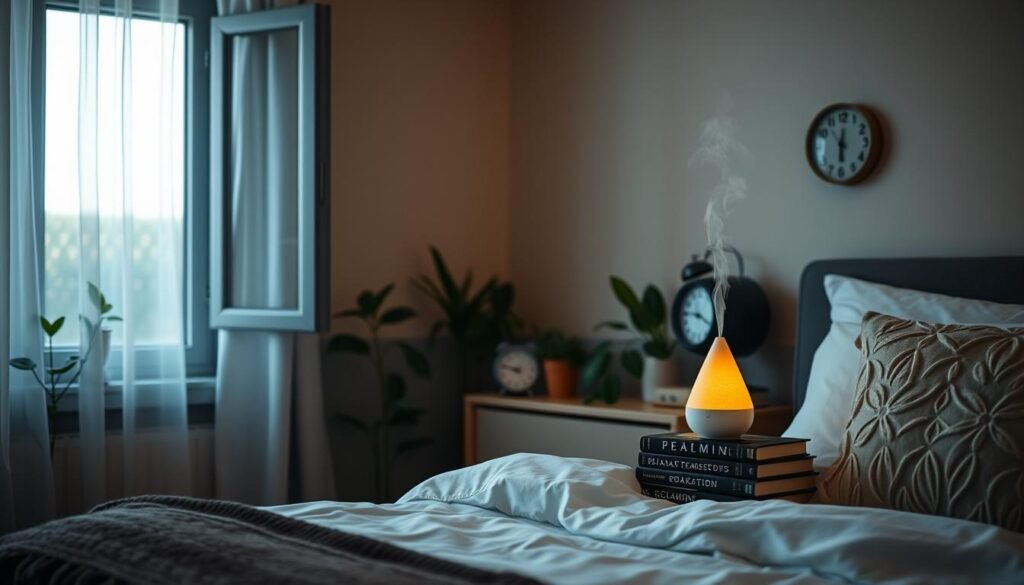Did you know that around 40 million adults in the U.S. are affected by anxiety disorders? This makes it the top mental illness in the country. Anxiety and sleep problems are closely linked. For those dealing with anxiety, getting enough sleep can be tough.
This often starts a hard cycle. Not enough sleep makes anxiety worse, and more anxiety makes sleeping hard. Adults who get less than seven hours of sleep risk health issues like high blood pressure and depression.
In this article, you will learn how anxiety affects sleep. You’ll find out about ways to fall asleep even when anxious. Techniques like relaxing before bed, setting a bedtime routine, and mindfulness can help you sleep better.
Key Takeaways
- Understanding the interplay between anxiety and sleep is crucial for improving rest.
- Relaxation methods can effectively reduce anxiety and help with falling asleep.
- Creating a consistent bedtime routine can help train the body for better sleep.
- Practicing sleep hygiene tips can significantly enhance sleep quality.
- Seeking professional help is vital if anxiety and sleep issues persist.
The Impact of Anxiety on Sleep
Anxiety messes with how well we sleep. This trouble sleeping can create even more stress. The effects of anxiety on rest are serious. They can turn into chronic sleep problems that many people face. In the United States, about 9% to 20% of adults have insomnia because of anxiety. At night, with less to distract us, anxious thoughts at night can really take over. This makes it hard to sleep well.
Research shows that almost 37% of adults in the UK have symptoms of insomnia. France and other places see the same problem. This shows us that anxiety and sleep disorders are a worldwide issue. Anxiety can make it hard to fall asleep or stay asleep. Then, not sleeping well makes us feel more anxious during the day.
People with anxiety disorders often don’t sleep well. Between 24% to 36% say insomnia is a big problem for them. This shows how important it is to treat both anxiety and sleep problems. For more help, check out Sleep Foundation. They have a lot of information on these issues.
Understanding Sleep Mechanics
To understand sleep, we need to look at sleep pressure and the circadian rhythm. Sleep pressure builds up the more we’re awake. This makes us feel tired and ready to sleep. Meanwhile, our circadian rhythm is like an internal clock. It tells us when to feel alert and when to feel sleepy during the day.
Adults usually need between 7 to 9 hours of sleep. School kids need about 9.5 hours each night. Babies can sleep for 16 to 18 hours a day to grow well. While we sleep, our bodies cycle through stages that last 70 to 120 minutes each. These stages include NREM and REM sleep. REM sleep is super important for remembering things and learning.
Sometimes, sleep pressure and our circadian rhythm don’t match up, like when we’re anxious. Anxiety can make our brains overly alert. This makes it tough to relax and fall asleep, even if we’re really tired.
Today, lots of people use apps and devices to keep track of their sleep. Techniques from cognitive behavioral therapy, like paradoxical intention, help fight insomnia too. By not stressing about sleep, we can actually sleep better.
Knowing how sleep works helps us deal with sleep issues, especially those linked to anxiety. By understanding sleep’s mechanics, we can create better habits for a good night’s rest. This reduces the impact of anxiety on our sleep quality.
Why Anxiety Keeps You Awake
Anxiety and sleep problems often go hand in hand. About 30% of adults face anxiety disorders sometime. Generalized Anxiety Disorder (GAD) makes people worry a lot about money, work, and relationships. Our brains react to stress in ways that can keep us awake. It’s like our ancestors who needed to stay alert for dangers.
It’s hard to sleep when you’re anxious because your mind tells you to watch out. About half the people with anxiety also struggle with sleep. This can make a bad cycle of worry and not sleeping well. In fact, out of people with sleeping problems, 33% also have anxiety disorders. Panic attacks at night are common too, affecting 20% to 45% of those with panic disorders.
To get out of this cycle, there are ways to help. Managing anxiety and getting good sleep are crucial. Making lifestyle changes like a steady sleep routine and regular exercise helps. Trying cognitive behavioral therapy for insomnia (CBT-I) can also make things better. For more advice, check out this resource.
| Type of Anxiety Disorder | Common Symptoms | Liability of Sleep Issues |
|---|---|---|
| Generalized Anxiety Disorder (GAD) | Overwhelming worries about daily stressors | High |
| Panic Disorder | Repeated panic attacks, resembling heart attack symptoms | Very High |
| Social Anxiety Disorder | Worries about being judged in social situations | High |
| Insomnia (related to Anxiety) | Difficulty falling or staying asleep | 33% |
Techniques for Falling Asleep with Anxiety
Anxiety can make it hard to sleep. It’s important to find ways to relax before bedtime. Methods like deep breathing and relaxation can calm the mind. This is key for a good night’s sleep. These techniques are not just good for handling anxiety. They also improve your overall health.
Relaxation Techniques
Many relaxation strategies help reduce stress and improve sleep. These methods trigger the body’s natural calm state. Doing activities like yoga, tai chi, or meditation daily can lessen stress. It’s a fact that calm minds lead to better sleep. Plus, about 44 percent of adults struggle with sleep because of stress each month.
- Progressive muscle relaxation
- Guided imagery
- Yoga and tai chi
These techniques promote relaxation. They can make it easier to fall into deep sleep.
Breathing Exercises for Anxiety and Sleep
Deep breathing is simple but powerful for easing anxiety and improving sleep. The 4-7-8 technique is one good method. You breathe in for four seconds, hold for seven, and exhale for eight. This can help calm your mind and get it ready for sleep.

Research suggests that slow breathing helps more than some sleep medications. Making these exercises part of your nightly routine can help. You’ll get the seven hours of sleep you need for good health. Doing this regularly can lower stress hormones and increase the quality and length of sleep.
Using these relaxation and breathing methods daily can help you deal with sleep issues caused by anxiety. With practice, they can help ensure more restful nights, becoming a regular part of your life.
Common Sleep Disorders Linked to Anxiety
Sleep disorders linked to anxiety play a big role in a person’s well-being. Insomnia is a top issue among adults. About one-third of adults struggle with insomnia symptoms. From these, 4% to 22% actually meet the criteria for having insomnia disorder. Insomnia can be short-term or long-lasting. Anxiety often makes it worse.
Sleep anxiety is another issue that many face. It happens when people worry too much about falling asleep. This worry makes their sleep problems even worse. Because of this, they might find their insomnia getting more severe.
Nocturnal panic attacks add to these sleep challenges. They cause someone to wake up in fear. Along with fear, they might have a fast heartbeat or trouble breathing. Such experiences harm their sleep quality significantly.
Statistics show how serious these issues are:
| Statistic | Value |
|---|---|
| Adults reporting insomnia symptoms | Approximately 1/3 |
| Individuals meeting insomnia disorder criteria | 4% to 22% |
| Americans suffering from chronic sleep disorders | Over 50 million |
| Americans rating their sleep quality as poor or fair | 34% |
| High school students achieving adequate sleep | 30% |
| Insomnia affecting individuals with mental disorders | 40-50% |
The link between anxiety and sleep disorders is clear. Dealing with these can improve mental health and life quality. Knowing about these common sleep problems is the first step. It helps in finding ways to manage them better.
Establishing a Healthy Bedtime Routine
Setting up a daily bedtime routine is key to better sleep, especially for those dealing with anxiety. Adding calming activities before bed makes it easier to relax. This includes making your sleep space cozy and trying mindfulness to help you drift off.
Creating a Relaxing Environment
To get ready for sleep, create a calm atmosphere. Lowering lights helps your body know it’s time to rest. Keeping your room between 65 to 68 degrees Fahrenheit makes it cozy. These changes can really boost how well you sleep. Don’t forget to:
- Warm Bath: A warm bath can make you sleepy by cooling your body down afterward.
- Pink Noise: Sounds like rain help you sleep better by soothing you.
- Comfortable Bedding: A comfy bed for sleeping only can make relaxation a habit.
Incorporating Mindfulness Practices for Sleep
Mindfulness can help calm your mind and ease you into sleep, lessening anxiety. Practices like meditation or gentle yoga help quiet your thoughts. Try these for a better night’s sleep:
- Journaling: Writing down your thoughts can help clear your mind before bed.
- Reading: A simple story can cut stress in half quickly.
- Practicing Yoga: Regular yoga improves your sleep overall.
With a healthy bedtime routine, you can enjoy a good night’s sleep. This lets you wake up feeling refreshed and ready to tackle the day.

| Activity | Benefit |
|---|---|
| Warm Bath | Triggers sleepiness through body temperature regulation |
| Pink Noise | Improves sleep quality |
| Journaling | Helps process thoughts, reduces anxiety |
| Yoga | Enhances overall sleep quality |
| Reading | Reduces stress and promotes relaxation |
Natural Remedies for Anxiety and Sleep
Many people struggle with anxiety that affects their sleep. This can harm their overall health. Using natural sleep aids can help manage these issues. Herbal treatments like chamomile and lavender are known for their calming properties. They help create a peaceful environment that promotes sleep.
Staying active is another good strategy. Regular exercise helps reduce the symptoms of anxiety. Some studies show that intense workouts could be especially effective. Combining exercise with stress-relief techniques like meditation may relax your mind. This makes falling asleep easier.
Progressive muscle relaxation and journaling are also beneficial. They reduce physical tension and help you process emotions, lowering anxiety. Managing your time well can ease stress from too many tasks. This leads to a more organized life.
Aromatherapy can create a calm setting. Scents from plants, such as lavender and chamomile, aid in relaxation. Drinking chamomile tea can lower stress hormones, improving relaxation. While less proven, CBD oil is explored for its ability to lessen anxiety.
Several natural methods can help with anxiety and poor sleep. Adopting these practices, alongside a balanced lifestyle, may enhance sleep quality. For detailed information on effective natural sleep aids, visit this comprehensive resource.
The Role of Sleep Hygiene Tips
To get better sleep, it’s key to follow good sleep hygiene, especially if you’re anxious. Starting a routine makes a big difference, improving sleep and overall health. Making sure to sleep and wake up at the same time every day is important. It also helps to manage how much you use screens before bed.
Setting a Consistent Sleep Schedule
Having a regular sleep schedule helps keep your body’s clock on track. Try to sleep and wake up at the same time every day, even on weekends. This reduces feeling tired during the day.
Getting enough sunlight in the day is good too. Start your bedtime routine 30–60 minutes before you go to sleep. This could include relaxation techniques to help you fall asleep faster.
Avoiding Screens Before Bed
It’s important to limit screen time before bed to improve sleep. Turn off electronic devices at least an hour before going to sleep. This reduces blue light exposure, helping your body get ready for sleep.
Make your bedroom a calm place by keeping it quiet, dark, and cool, between 60 and 67°F (15.6 and 19.4°C). This makes sleeping easier.
Using these sleep hygiene tips not only helps with anxiety-related sleep problems. They also help you build healthy habits for better long-term wellness. For more tips on good sleep hygiene, visit this resource.

Seeking Professional Help
When you’ve tried everything to beat anxiety-related sleep issues and it’s not enough, it’s time to think about getting professional help. A trained mental health expert can offer the right mental health support just for you. Often, they suggest trying cognitive behavioral therapy for insomnia (CBT-I), a special program. It tackles the root causes of sleeplessness by changing negative thoughts and actions about sleep.
Not sleeping well due to anxiety affects your life in big ways. You might find it hard to think clearly, feel more stressed, and see a dip in your health. There are all sorts of things that can make sleep hard, like stress, health problems, or past trauma. This kind of anxiety can make your heart race and your chest hurt. It can also make you feel nervous and make it hard to focus.
Going through six to eight sessions of CBT-I can really turn things around. This method could involve learning new ways to think, educating yourself about sleep, and doing tasks to battle anxiety. Teaming up with health experts helps find the best treatment for anxiety. Also, changing your lifestyle can create a space that’s good for sleeping.
| Professional Help Options | Description | Benefits |
|---|---|---|
| Cognitive Behavioral Therapy (CBT) | A structured program targeting thought patterns related to sleep. | Reduces anxiety, enhances coping strategies. |
| Medication | Pharmaceutical options to manage anxiety and sleep. | Provides immediate relief in some cases. |
| Relaxation Techniques | Incorporation of exercises like deep breathing and mindfulness. | Helps reduce overall stress levels. |
| Support Groups | Opportunities for sharing experiences and coping strategies. | Creates a sense of community and understanding. |
Getting professional help does more than just treat anxiety symptoms. It also helps you build strategies for better sleep and a healthier life overall.
Conclusion
Getting a good night’s sleep while dealing with anxiety needs a well-rounded plan. People can really benefit from methods like relaxation exercises and sticking to a bedtime schedule. It’s also key to have a calming sleeping space and to cut back on caffeine.
If sleep problems persist, getting help from a professional can make a big difference. Remember, not every solution works the same for everyone. Trying different things, such as sipping a warm drink or using the 4-7-8 breathing technique, can help you find what works best for you.
With dedication and the right approach, peaceful sleep is within reach. As many people struggle with sleep issues, learning to manage nighttime anxiety is crucial. It empowers you to improve your overall health and well-being.